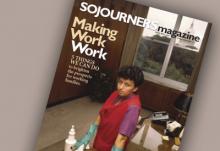Wealth Gap
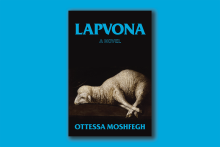
WHAT IS A devout village to believe in during a time of famine and plague? Ottessa Moshfegh presents a story devoid of hope and redemption in her latest novel Lapvona, proving that in dire times, believing is not a want but a need.
Moshfegh has a flare for brutality (Eileen and Death in Her Hands). With Lapvona, Moshfegh has crafted a medieval fantasy in the vein of Game of Thrones. It reads like a fairy-tale epic for adults, with its cast of fringe characters and fable-esque sequence of events. But this fantasy is far more depraved: As religious as the villagers are, there is no redemption to be found in this village.
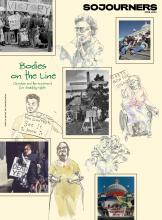
Disability rights sit-ins in the 1970s educated America and launched a civil rights movement. At the 45th anniversary, the church still lags behind.

An analysis by the 2016 American National Election Study has revealed that racism played a bigger part in Trump’s election than authoritarianism, reports the Washington Post.
The 2016 American National Election Study consisted of about 1,200 people from across the U.S. answering survey questions for more than an hour, the questions structured to reveal their political leanings.
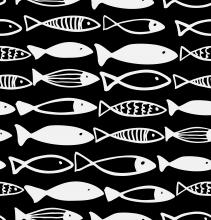
SHE WAS MAD—fuming.
Thirteen black evangelical leaders rolled across Southern states on a speaking tour of historic black colleges and universities. On a mission to call forth the next generation of black leaders, we traversed the land where our ancestors had worked fingers to bone, drank from separate fountains, and cut loved ones down from trees like dead fruit.
But this is not what made Vera mad.
For the last hour a crowd of black leaders sat, stood, and leaned in as we shared our stories of barriers to advancement within white evangelical organizations. It wasn’t a mean-spirited conversation. It was a needed one—a healing one. Our stories were strikingly similar, even though none of us had worked in the same organization.
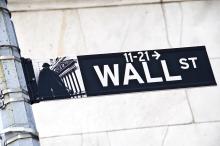
The interesting thing about human nature is that even among the oppressed, people will seek supremacy, a pecking order. We human beings have great capacity for tenderness and compassion, and we’re also the meanest things in the world! And even when we are oppressed together, we will try to find some advantage or superiority over others.
“As for you, my flock, saith the Lord, I shall judge between sheep and sheep, between rams and goats. Is it not enough for you to feed on the good pasture, but you must tread down with your feet the rest of your pasture?”
In other words: Do you have to get what’s yours and at the same time mess it up for others?

Recent studies from both the Urban Institute and the Pew Forum tell the story of America's growing racial wealth gap. In the May issue of Sojourners magazine, Otis Moss III talked about the unjust trend:
The call of the church has been, and always will be, to become the compassionate hands and feet of Christ. Poverty, when attached to race, is the original sin of America, a country built by slave labor and enriched by the unfair labor practices of the Industrial Revolution.
Read the full piece HERE.

See the full infographic at the jump.
Annie Lowrey reporter for the New York Times, writes about a new study released by the Urban Institute. The study found:
"The racial wealth gap yawned during the recession, even as the income gap between white Americans and nonwhite Americans remained stable. As of 2010, white families, on average, earned about $2 for every $1 that black and Hispanic families earned, a ratio that has remained roughly constant for the last 30 years."
However the wealth gap continues to grow.
"Before the recession, non-Hispanic white families, on average, were about four times as wealthy as nonwhite families, according to the Urban Institute’s analysis of Federal Reserve data. By 2010, whites were about six times as wealthy"
Read more here.
Climate scientists have warned that climate change will bring about—and already is bringing about—more frequent and fiercer storms. But climate change leads to far more than just destructive weather patterns, with consequences in almost all aspects of our lives. Here are just a few of the many possible effects of our rising global temperature.
Natural disasters will increase.
Climate change increases the risk of natural disasters that disproportionately affect low-income people who lack the resources to prepare, recover, or relocate.
Food will be scarcer and more expensive.
Food prices increase as farmers face new levels of unpredictability in weather patterns. Drought and floods may cause widespread soil infertility and increased plant diseases.
We'll experience more drought—and floods.
Changes in weather patterns lead to both increased drought and flooding, because warmer air can hold more water. Many dry places will become drier, while others will be inundated with rain.

While having lunch recently with Harvard Professor Robert D. Putnam, I was asked an interesting question.
Putnam is appalled at the radical lack of equality of opportunity in the U.S. today, and he wanted to know if evangelical preachers would dare to say what his pastor said when he was a teenager. Putnam told me that back then, in the midst of Martin Luther King’s great campaign against segregation, his devout Methodist pastor dared to preach that “racism is a sin.”
Professor Putnam asked me, as an evangelical, whether evangelical pastors today would be ready to declare today’s great economic inequality of opportunity a sin. That’s a great question.
This week's viral video is a must-see. The six-minute "Wealth Inequality in America," released Friday, presents the shocking, true size of the wealth gap in the country.
In a series of animated infographics, the video lends a visual punch to numbers that are hard to wrap one’s head around. The top 1 percent of Americans hold 50 percent of all investments in stocks and bonds, for example – while 80 percent of Americans share a paltry 7 percent of the nation’s wealth.

Why concentrated wealth and the growing gap between the rich and the rest of us are not only bad for our economy but threaten democracy itself.
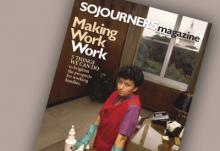
Collaboration between low- and middle-income people is one of the keys to rebuilding the broken American Dream.
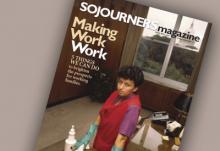
Affordable housing is vital for working people- and for the health of our communities.
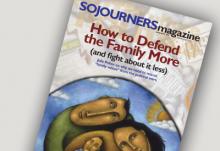
If preachers are preoccupied with pursuing the life of conscpicuous consumption and preaching a "prosperity gospel," then poor people are in big trouble.

For political strategist Grover Norquist, tax policy is just a means to a brutish end.
